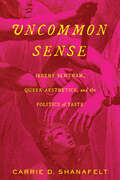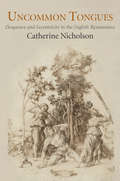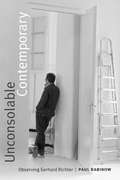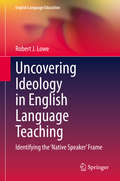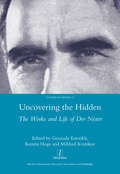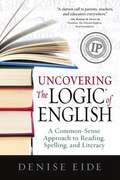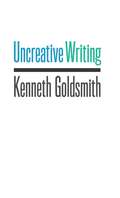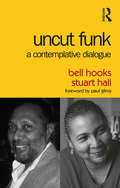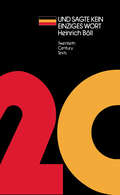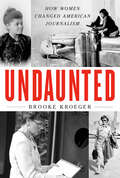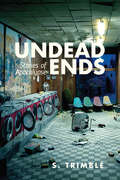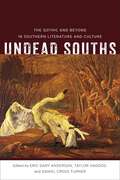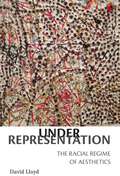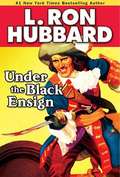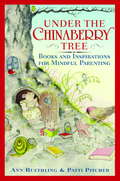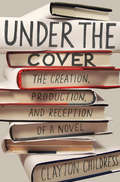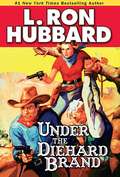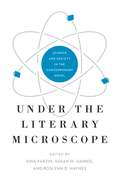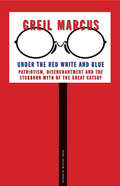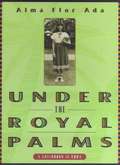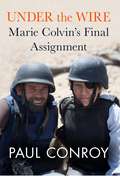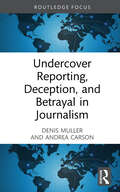- Table View
- List View
Uncommon Sense: Jeremy Bentham, Queer Aesthetics, and the Politics of Taste
by Carrie D. ShanafeltInfamous for authoring two concepts since favored by government powers seeking license for ruthlessness—the utilitarian notion of privileging the greatest happiness for the most people and the panopticon—Jeremy Bentham is not commonly associated with political emancipation. But perhaps he should be. In his private manuscripts, Bentham agonized over the injustice of laws prohibiting sexual nonconformity, questioning state policy that would put someone to death merely for enjoying an uncommon pleasure. He identified sources of hatred for sexual nonconformists in philosophy, law, religion, and literature, arguing that his goal of "the greatest happiness" would be impossible as long as authorities dictate whose pleasures can be tolerated and whose must be forbidden. Ultimately, Bentham came to believe that authorities worked to maximize the suffering of women, colonized and enslaved persons, and sexual nonconformists in order to demoralize disenfranchised people and prevent any challenge to power.In Uncommon Sense, Carrie Shanafelt reads Bentham’s sexual nonconformity papers as an argument for the toleration of aesthetic difference as the foundation for egalitarian liberty, shedding new light on eighteenth-century aesthetics and politics. At odds with the common image of Bentham as a dehumanizing calculator or an eccentric projector, this innovative study shows Bentham at his most intimate, outraged by injustice and desperate for the end of sanctioned, discriminatory violence.
Uncommon Tongues: Eloquence and Eccentricity in the English Renaissance
by Catherine NicholsonIn the late sixteenth century, as England began to assert its integrity as a nation and English its merit as a literate tongue, vernacular writing took a turn for the eccentric. Authors such as John Lyly, Edmund Spenser, and Christopher Marlowe loudly announced their ambitions for the mother tongue--but the extremity of their stylistic innovations yielded texts that seemed hardly English at all. Critics likened Lyly's hyperembellished prose to a bejeweled "Indian," complained that Spenser had "writ no language," and mocked Marlowe's blank verse as a "Turkish" concoction of "big-sounding sentences" and "termes Italianate. " In its most sophisticated literary guises, the much-vaunted common tongue suddenly appeared quite foreign. In Uncommon Tongues, Catherine Nicholson locates strangeness at the paradoxical heart of sixteenth-century vernacular culture. Torn between two rival conceptions of eloquence, savvy writers and teachers labored to reconcile their country's need for a consistent, accessible mother tongue with the expectation that poetic language depart from everyday speech. That struggle, waged by pedagogical theorists and rhetoricians as well as authors we now recognize as some of the most accomplished and significant in English literary history, produced works that made the vernacular's oddities, constraints, and defects synonymous with its virtues. Such willful eccentricity, Nicholson argues, came to be seen as both the essence and antithesis of English eloquence.
Unconsolable Contemporary: Observing Gerhard Richter
by Paul RabinowIn Unconsolable Contemporary Paul Rabinow continues his explorations of "a philosophic anthropology of the contemporary." Defining the contemporary as a moving ratio in which the modern becomes historical, Rabinow shows how an anthropological ethos of the contemporary can be realized by drawing on the work of art historians, cultural critics, social theorists, and others, thereby inventing a methodology he calls anthropological assemblage. He focuses on the work and persona of German painter Gerhard Richter, demonstrating how reflecting on Richter's work provides rich insights into the practices and stylization of what, following Aby Warburg, one might call "the afterlife of the modern." Rabinow opens with analyses of Richter's recent Birkenau exhibit: both the artwork and its critical framing. He then chronicles Richter's experiments in image-making as well as his subtle inclusion of art historical and critical discourses about the modern. This, Rabinow contends, enables Richter to signal his awareness of the stakes of such theorizing while refusing the positioning of his work by modernist critical theorists. In this innovative work, Rabinow elucidates the ways meaning is created within the contemporary.
Uncovering Ideology in English Language Teaching: Identifying the 'Native Speaker' Frame (English Language Education #19)
by Robert J. LoweThis book introduces the concept of the ‘native speaker’ frame: a perceptual filter within English Language Teaching (ELT) which views the linguistic and cultural norms and the educational technology of the anglophone West as being normative, while the norms and practices of non-Western countries are viewed as deficient. Based on a rich source of ethnographic data, and employing a frame analysis approach, it investigates the ways in which this ‘native-speaker’ framing influenced the construction and operation of a Japanese university EFL program. While the program appeared to be free of explicit expressions of native-speakerism, such as discrimination against teachers, this study found that the practices of the program were underpinned by implicitly native-speakerist assumptions based on the stereotyping of Japanese students and the Japanese education system. The book provides a new perspective on debates around native-speakerism by examining how the dominant framing of a program may still be influenced by the ideology, even in cases where overt signs of native-speakerism appear to be absent.
Uncovering the Hidden: The Works and Life of Der Nister
by Gennady EstraikhDer Nister (Pinkhes Kahanovitsh, 1884-1950) is widely regarded as the most enigmatic author in modern Yiddish literature. His pseudonym, which translates as 'The Hidden One', is as puzzling as his diverse body of works, which range from mystical symbolist poetry and dark expressionist tales to realist historical epic. Although part of the Kiev Group of Yiddish writers, which also included David Bergelson and Peretz Markish, Der Nister remained at the margins of the Yiddish literary world throughout his life, mainstream success eluding him both in- and outside the Soviet Union. Yet, to judge from the quantity of recent research and translation work, der Nister is today one of the best remembered Yiddish modernists. The present collection of twelve original articles by international scholars re-examines Der Nister's cultural and literary legacy, bringing to light new aspects of his life and creative output.
Uncovering the Logic of English: A Common-Sense Approach to Reading, Spelling, and Literacy
by Denise EideMultiple award-winning book on reading and spelling education that will transform how you think about English! Do you know a student who is good at math or science but struggles with reading or spelling? Has a student ever asked you a question about English spelling to which you replied, "That's an exception"? Have you ever abandoned a word while writing because spell check didn't recognize it? Discover this revolutionary method that Dr. Temple Grandin called "really helpful for teaching reading to children who are mathematical pattern thinkers..." Predominant reading methods require students to break the complex code of English without help. This has resulted in low literacy rates and explains why many highly educated professionals cannot spell. By revealing the logical patterns underlying 98% of English words, Uncovering the Logic of English eliminates the need to guess and provides a logical solution to English spelling. Simple answers are given for questions such as: Why is there a silent final E in have? Why don't we drop the E in noticeable? Why is discussion spelled with -sion rather than -tion? As the rules unfold it becomes apparent how this knowledge is vital to reversing the educational crisis that is plaguing America. This slim volume is easy to read and accessible to parents and classroom teachers. A thorough appendix summarizes the most important concepts for quick reference.
Uncreative Writing: Managing Language in the Digital Age (Columbia Studies In Contemporary American History)
by Kenneth GoldsmithCan techniques traditionally thought to be outside the scope of literature, including word processing, databasing, identity ciphering, and intensive programming, inspire the reinvention of writing? The Internet and the digital environment present writers with new challenges and opportunities to reconceive creativity, authorship, and their relationship to language. Confronted with an unprecedented amount of texts and language, writers have the opportunity to move beyond the creation of new texts and manage, parse, appropriate, and reconstruct those that already exist. In addition to explaining his concept of uncreative writing, which is also the name of his popular course at the University of Pennsylvania, Goldsmith reads the work of writers who have taken up this challenge. Examining a wide range of texts and techniques, including the use of Google searches to create poetry, the appropriation of courtroom testimony, and the possibility of robo-poetics, Goldsmith joins this recent work to practices that date back to the early twentieth century. Writers and artists such as Walter Benjamin, Gertrude Stein, James Joyce, and Andy Warhol embodied an ethos in which the construction or conception of a text was just as important as the resultant text itself. By extending this tradition into the digital realm, uncreative writing offers new ways of thinking about identity and the making of meaning.
Uncut Funk: A Contemplative Dialogue
by Stuart Hall bell hooksIn an awesome meeting of minds, cultural theorists Stuart Hall and bell hooks met for a series of wide-ranging conversations on what Hall sums up as "life, love, death, sex." From the trivial to the profound, across boundaries of age, sexualities and genders, hooks and Hall dissect topics and themes of continual contemporary relevance, including feminism, home and homecoming, class, black masculinity, family, politics, relationships, and teaching. In their fluid and honest dialogue they push and pull each other as well as the reader, and the result is a book that speaks to the power of conversation as a place of critical pedagogy.
Und Sagte Kein Einziges Wort (Twentieth Century Texts)
by Heinrich BollIncludes the full German text, accompanied by German-English vocabulary. Notes and a detailed introduction in English put the work in its social and historical context.
Undaunted: How Women Changed American Journalism
by Brooke KroegerAn essential history of women in American journalism, showcasing exceptional careers from 1840 to the present <p><p> Undaunted is a representative history of the American women who surmounted every impediment put in their way to do journalism’s most valued work. From Margaret Fuller’s improbable success to the highly paid reporters of the mid-nineteenth century to the breakthrough investigative triumphs of Nellie Bly, Ida Tarbell, and Ida B. Wells, Brooke Kroeger examines the lives of the best-remembered and long-forgotten woman journalists. She explores the careers of standout woman reporters who covered the major news stories and every conflict at home and abroad since before the Civil War, and she celebrates those exceptional careers up to the present, including those of Martha Gellhorn, Rachel Carson, Janet Malcolm, Joan Didion, Cokie Roberts, and Charlayne Hunter-Gault. <p><p> As Kroeger chronicles the lives of journalists and newsroom leaders in every medium, a larger story develops: the nearly two-centuries-old struggle for women’s rights. Here as well is the collective fight for equity from the gentle stirrings of the late 1800s through the legal battles of the 1970s to the #MeToo movement and today’s racial and gender disparities. <p><p> Undaunted unveils the huge and singular impact women have had on a vital profession still dominated by men.
Undead Ends: Stories of Apocalypse
by S. TrimbleUndead Ends is about how we imagine humanness and survival in the aftermath of disaster. This book frames modern British and American apocalypse films as sites of interpretive struggle. It asks what, exactly, is ending? Whose dreams of starting over take center stage, and why? And how do these films, sometimes in spite of themselves, make room to dream of new beginnings that don’t just reboot the world we know? Trimble argues that contemporary apocalypse films aren’t so much envisioning The End of the world as the end of a particular world; not The End of humanness but, rather, the end of Man. Through readings of The Road, I Am Legend, 28 Days Later, 28 Weeks Later, Children of Men, and Beasts of the Southern Wild, this book demonstrates that popular stories of apocalypse can trouble, rather than reproduce, Man’s story of humanness. With some creative re-reading, they can even unfold towards unexpected futures. Mainstream apocalypse films are, in short, an occasion to imagine a world After Man.
Undead Souths: The Gothic and Beyond in Southern Literature and Culture (Southern Literary Studies)
by Taylor Hagood Daniel Cross Turner Eric Gary AndersonDepictions of the undead in the American South are not limited to our modern versions, such as the vampires in True Blood and the zombies in The Walking Dead. As Undead Souths reveals, physical emanations of southern undeadness are legion, but undeadness also appears in symbolic, psychological, and cultural forms, including the social death endured by enslaved people, the Cult of the Lost Cause that resurrected the fallen heroes of the Confederacy as secular saints, and mourning rites revived by Native Americans forcibly removed from the American Southeast. To capture the manifold forms of southern haunting and horror, Undead Souths explores a variety of media and historical periods, establishes cultural crossings between the South and other regions within and outside of the U.S., and employs diverse theoretical and critical approaches. The result is an engaging and inclusive collection that chronicles the enduring connection between southern culture and the refusal of the dead to stay dead.
Under Representation: The Racial Regime of Aesthetics
by David LloydUnder Representation shows how the founding texts of aesthetic philosophy ground the racial order of the modern world in our concepts of universality, freedom, and humanity. In taking on the relation of aesthetics to race, Lloyd challenges the absence of sustained thought about race in postcolonial studies, as well as the lack of sustained attention to aesthetics in critical race theory.Late Enlightenment discourse on aesthetic experience proposes a decisive account of the conditions of possibility for universal human subjecthood. The aesthetic forges a powerful “racial regime of representation” whose genealogy runs from enlightenment thinkers like Kant and Schiller to late modernist critics like Adorno and Benjamin. For aesthetic philosophy, representation is not just about depiction of diverse humans or inclusion in political or cultural institutions. It is an activity that undergirds the various spheres of human practice and theory, from the most fundamental acts of perception and reflection to the relation of the subject to the political, the economic, and the social.Representation regulates the distribution of racial identifications along a developmental trajectory: The racialized remain “under representation,” on the threshold of humanity and not yet capable of freedom and civility as aesthetic thought defines those attributes. To ignore the aesthetic is thus to overlook its continuing force in the formation of the racial and political structures down to the present. Across five chapters, Under Representation investigates the aesthetic foundations of modern political subjectivity; race and the sublime; the logic of assimilation and the stereotype; the subaltern critique of representation; and the place of magic and the primitive in modernist concepts of art, aura and representation.Both a genealogy and an account of our present, Under Representation ultimately helps show how a political reading of aesthetics can help us build a racial politics adequate for the problems we face today, one that stakes claims more radical than multicultural demands for representation.
Under Western Eyes: India from Milton to Macaulay
by Patrick Brantlinger Balachandra Rajan Michael MurrinSpanning nearly two and a half centuries of English literature about India, Under Western Eyes traces the development of an imperial discourse that governed the English view of India well into the twentieth century. Narrating this history from its Reformation beginnings to its Victorian consolidation, Balachandra Rajan tracks this imperial presence through a wide range of literary and ideological sites. In so doing, he explores from a postcolonial vantage point collusions of gender, commerce, and empire--while revealing the tensions, self-deceptions, and conflicts at work within the English imperial design.Rajan begins with the Portuguese poet Camões, whose poem celebrating Vasco da Gama's passage to India becomes, according to its eighteenth-century English translator, the epic of those who would possess India. He closely examines Milton's treatment of the Orient and Dryden's Aureng-Zebe, the first English literary work on an Indian subject. Texts by Shelley, Southey, Mill, and Macaulay, among others, come under careful scrutiny, as does Hegel's significant impact on English imperial discourse. Comparing the initial English representation of its actions in India (as a matter of commerce, not conquest) and its contemporaneous treatment of Ireland, Rajan exposes contradictions that shed new light on the English construction of a subaltern India.
Under the Black Ensign
by L. Ron HubbardRiveting, historical accounts of daredevils, pilots and brutal madmen... Tom Bristol's career as first mate of the Maryland bark Randolph abruptly ends during shore leave when he is press-ganged into serving aboard the British HMS Terror.Toil under the cruel whip of England is merciless: Crew members are treated as little more than chattel--barely fed, made to work past the brink of exhaustion and kept in line with a cat-o'-nine-tails. Fate finally smiles on young Bristol when the vessel is overtaken by pirates and he gladly turns coat and joins them.Yet Tom's new pirate mates desert him quickly after he's found guilty of killing a mutinous pirate and unwittingly harboring a woman on board. Marooned on a deserted island, Tom has nothing but a small supply of water, a gun and just enough bullets to kill himself. But Tom dreams up a devious plan that will return him to the high seas and make his past adventures pale compared to what he has in store for his many enemies. . . . "Beats any Pirates of the Caribbean story you will find."--Associated Content* A National Indie Excellence Award Winner
Under the Chinaberry Tree
by Ann Ruethling Patti PitcherCelebrating Chinaberry's twentieth anniversary, the women behind America's beloved children's book catalog share their wisdom about the joys of children's literature and parenting. The Chinaberry catalog was created when Ann Ruethling became troubled by the violence in many old-fashioned nursery stories and the poor grammar or mediocre plots in newer children's books. Handpicking a hundred high-quality titles a year, she has become an indispensable friend to thousands of parents, and Chinaberry has become a gold standard for its industry. Under the Chinaberry Tree celebrates the world of children's books. In warm "one-mother-to-another" prose, Ruethling and her business partner, Patti Pitcher, reflect on the family-first concepts that resonate so strongly with Chinaberry fans and all parents. Exploring the books that have made a difference in their children's lives, the tender experience of reading with children and the moments that make parenting a unique journey, this guide is sure to enrich every family's bookshelf. From the Trade Paperback edition.
Under the Cover: The Creation, Production, and Reception of a Novel
by Clayton ChildressUnder the Cover follows the life trajectory of a single work of fiction from its initial inspiration to its reception by reviewers and readers. The subject is Jarrettsville, a historical novel by Cornelia Nixon, which was published in 2009 and based on an actual murder committed by an ancestor of Nixon's in the postbellum South.Clayton Childress takes you behind the scenes to examine how Jarrettsville was shepherded across three interdependent fields—authoring, publishing, and reading—and how it was transformed by its journey. Along the way, he covers all aspects of the life of a book, including the author's creative process, the role of the literary agent, how editors decide which books to acquire, how publishers build lists and distinguish themselves from other publishers, how they sell a book to stores and publicize it, and how authors choose their next projects. Childress looks at how books get selected for the front tables in bookstores, why reviewers and readers can draw such different meanings from the same novel, and how book groups across the country make sense of a novel and what it means to them.Drawing on original survey data, in-depth interviews, and groundbreaking ethnographic fieldwork, Under the Cover reveals how decisions are made, inequalities are reproduced, and novels are built to travel in the creation, production, and consumption of culture.
Under the Diehard Brand
by L. Ron HubbardExperience a tale from the Old West. When Lee Thompson is making the long journey from Texas to Montana to see his aging father, he gets wind of the fact that the old man, one Sheriff Diehard Thompson, is losing control over Wolf River's town troublemakers. So, Lee decides to step in.Lee's choice is a tough one, as the rule of law and his father's reputation hang in the balance. Since Diehard hasn't seen Lee in fifteen year's, Lee's not entirely surprised when his father doesn't recognize him. But more trouble awaits; it seems every frontier criminal has heard the same rumor of how easy the town is for outlaws, and nobody's seen the sheriff draw in three years. Now they're all on their way.ALSO INCLUDES THE WESTERN STORIES: "THE GHOST TOWN GUN-GHOST" AND "HOSS TAMER""Plus, Under the Diehard Brand gives the reader and listener three solid stories--and two real winners--for the price of one."--Somebody Dies, Craig Clarke book review
Under the Eye of the Clock: The Life Story of Christopher Nolan
by Christopher NolanThis memoir, told as the story of Joseph. Nolan's birth injuries left him quadriplegic and completely unable to speak, so for years no one suspected that his mind, though caged in an inert body, was burning to express his inner thoughts and ideas.
Under the Literary Microscope: Science and Society in the Contemporary Novel (AnthropoScene #7)
by Sina Farzin Roslynn D. Haynes Susan M. Gaines“Science in fiction,” “geek novels,” “lab-lit”—whatever one calls them, a new generation of science novels has opened a space in which the reading public can experience and think about the powers of science to illuminate nature as well as to generate and mitigate social change and risks. Under the Literary Microscope examines the implications of the discourse taking place in and around this creative space.Exploring works by authors as disparate as Barbara Kingsolver, Richard Powers, Ian McEwan, Ann Patchett, Margaret Atwood, and Michael Crichton, these essays address the economization of scientific institutions; ethics, risk, and gender disparity in scientific work; the reshaping of old stereotypes of scientists; science in an evolving sci-fi genre; and reader reception and potential contributions of the novels to public understandings of science.Under the Literary Microscope illuminates the new ways in which fiction has been grappling with scientific issues—from climate change and pandemics to artificial intelligence and genomics—and makes a valuable addition to both contemporary literature and science studies courses.In addition to the editors, the contributors include Anna Auguscik, Jay Clayton, Carol Colatrella, Sonja Fücker, Raymond Haynes, Luz María Hernández Nieto, Emanuel Herold, Karin Hoepker, Anton Kirchhofer, Antje Kley, Natalie Roxburgh, Uwe Schimank, Sherryl Vint, and Peter Weingart.
Under the Literary Microscope: Science and Society in the Contemporary Novel (AnthropoScene: The SLSA Book Series #7)
by Sina Farzin Roslynn D. Haynes Susan M. Gaines"Science in fiction," "geek novels," "lab-lit"—whatever one calls them, a new generation of science novels has opened a space in which the reading public can experience and think about the powers of science to illuminate nature as well as to generate and mitigate social change and risks. Under the Literary Microscope examines the implications of the discourse taking place in and around this creative space.Exploring works by authors as disparate as Barbara Kingsolver, Richard Powers, Ian McEwan, Ann Patchett, Margaret Atwood, and Michael Crichton, these essays address the economization of scientific institutions; ethics, risk, and gender disparity in scientific work; the reshaping of old stereotypes of scientists; science in an evolving sci-fi genre; and reader reception and potential contributions of the novels to public understandings of science.Under the Literary Microscope illuminates the new ways in which fiction has been grappling with scientific issues—from climate change and pandemics to artificial intelligence and genomics—and makes a valuable addition to both contemporary literature and science studies courses.In addition to the editors, the contributors include Anna Auguscik, Jay Clayton, Carol Colatrella, Sonja Fücker, Raymond Haynes, Luz María Hernández Nieto, Emanuel Herold, Karin Hoepker, Anton Kirchhofer, Antje Kley, Natalie Roxburgh, Uwe Schimank, Sherryl Vint, and Peter Weingart.
Under the Red White and Blue: Patriotism, Disenchantment and the Stubborn Myth of the Great Gatsby
by Greil MarcusA deep dive into how F. Scott Fitzgerald’s vision of the American Dream has been understood, portrayed, distorted, misused, and kept alive Renowned critic Greil Marcus takes on the fascinating legacy of F. Scott Fitzgerald’s The Great Gatsby. An enthralling parable (or a cheap metaphor) of the American Dream as a beckoning finger toward a con game, a kind of virus infecting artists of all sorts over nearly a century, Fitzgerald’s story has become a key to American culture and American life itself. Marcus follows the arc of The Great Gatsby from 1925 into the ways it has insinuated itself into works by writers such as Philip Roth and Raymond Chandler; found echoes in the work of performers from Jelly Roll Morton to Lana Del Rey; and continued to rewrite both its own story and that of the country at large in the hands of dramatists and filmmakers from the 1920s to John Collins’s 2006 Gatz and Baz Luhrmann’s critically reviled (here celebrated) 2013 movie version—the fourth, so far.
Under the Royal Palms: A Childhood in Cuba
by Alma Flor AdaThe author recalls her life and impressions growing up in Cuba.<P><P> Winner of the Pura Belpre Medal
Under the Wire: Marie Colvin's Final Assignment
by Paul ConroyA riveting war journal from photographer Paul Conroy, who accompanied Marie Colvin during her ill-fated final assignment in Syria.
Undercover Reporting, Deception, and Betrayal in Journalism (Routledge Focus on Journalism Studies)
by Andrea Carson Denis MullerThis book discusses undercover reporting and deception in journalism, addressing the ethical issues encountered by professionals when deception is involved and providing an explanation of how high-profile cases have developed. Carson and Muller begin by examining how philosophical theories which form the basis of contemporary ethical codes for journalists, bear upon undercover reporting and questions of deception in the digital age. Drawing upon case studies such as Al Jazeera’s undercover operation against the National Rifle Association in the US and the One Nation political party in Australia, and Britain’s Channel 4 infiltration of Cambridge Analytica, this book goes on to define and discuss the ethical concepts behind deception and betrayal and lays out an original ethical framework for undercover journalists facing related challenges in their work. Undercover Reporting, Deception and Betrayal in Journalism is an important research text for students and academics in journalism and media studies.
